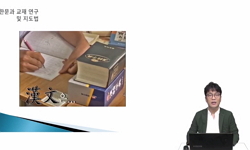Currently, sixteen peer-review journals related to Japanese literature make it to the National Research Foundation of Korea (NRF) list and two journals are under consideration. A statistical study conducted in 2012 shows that 493 Korean authors includ...
http://chineseinput.net/에서 pinyin(병음)방식으로 중국어를 변환할 수 있습니다.
변환된 중국어를 복사하여 사용하시면 됩니다.
- 中文 을 입력하시려면 zhongwen을 입력하시고 space를누르시면됩니다.
- 北京 을 입력하시려면 beijing을 입력하시고 space를 누르시면 됩니다.

한국의 일본근현대문학 연구 현황과 과제 = Studies on Modern and Contemporary Japanese Literature in Korea: Present and Future
한글로보기https://www.riss.kr/link?id=A60303244
- 저자
- 발행기관
- 학술지명
- 권호사항
-
발행연도
2012
-
작성언어
Korean
- 주제어
-
KDC
830
-
등재정보
KCI등재
-
자료형태
학술저널
- 발행기관 URL
-
수록면
83-106(24쪽)
- 제공처
- 소장기관
-
0
상세조회 -
0
다운로드
부가정보
다국어 초록 (Multilingual Abstract)
Currently, sixteen peer-review journals related to Japanese literature make it to the National Research Foundation of Korea (NRF) list and two journals are under consideration. A statistical study conducted in 2012 shows that 493 Korean authors including 54 Japanese ones published 1,614 journal articles on modern and contemporary Japanese literature during the years of 2005-11. 231 journal articles were annually published, which tells each author on average published 3.3 articles. It is notable that 69 authors annually published more than one article in the area of modern/contemporary Japanese literature. The journal articles published in Korea mostly deal with modern/contemporary Japanese writers, which counts 184 in total. Akutagawa is studied the most and Soseki is the next in rank. Oe is ranked third and Haruki is fifth, which shows the trend that studies on contemporary writers are remarkably increasing. Kawabata is also ranked fourth, Dazai and Toson have been stably studied, each ranked sixth and seventh among the most-studied writers. As a top subject matter, scholars focus on "society." "Anguish," "relationship between man and woman," "religion," and "family" have been treated in order. Concerning the methodologies/approaches, studies have been done with the use of "expression." "Comparative study," "Korean-Japanese literature/writers," "Images of Korea(n)" have considerably increased as predicted in the 2005 review. 129 books on modern/contemporary Japanese literature were published in Korea and this means eighteen books were published annually over the past seven years. 54 books including co-authored ones are strongly research-oriented; 27 books are characteristic of introductions/responses to modern/contemporary Japanese literature; 25 books are categorized into the overview/literary history; 23 books are translated works from research books by Japanese scholars; 14 edited books consist of contributions from scholars, focusing on mostly Korean-Japanese literature and Christian literature. 26 books about seventeen writers including Kawabata and Akutagawa were published because scholars were actively involved in writing books and dissertations were also made into books. This statistical study helps us not only establish studies and researches on modern/contemporary Japanese literature in Korea, but also further them by envisioning their direction as well as by seeking new subjects regarding writers/themes/methodologies, etc. It is positive to observe increasing number of researchers and researches promote various societies and associations. More importantly, however, they should reconsider how to evaluate works in order to encourage scholars to produce high-quality research. Studies on Japanese literature should be adapted to the changes of environments not to mention coping with them. Considering humanities including the Japanese literature aim at understanding the human kind, they are effective in lessening conflicts over politics, economy, culture and society among nations. I hope that mutual studies on modern/contemporary Korean/Japanese literature will help develop the relation between Korea and Japan. I expect more of original researches either individually, or collaboratively in the area of modern/contemporary Japanese literature. It is necessary to encourage interdisciplinary and comparative studies as well as to continue establishing academic ties with foreign scholars and associations.
동일학술지(권/호) 다른 논문
-
- 한국일어일문학회
- 尾上新太郞 ( Ogami Shintaro )
- 2012
- KCI등재
-
- 한국일어일문학회
- 정상건 ( Inoue Ken )
- 2012
- KCI등재
-
- 한국일어일문학회
- 유은경 ( Eun Kyeong Yu )
- 2012
- KCI등재
-
- 한국일어일문학회
- 최관 ( Gwan Choi )
- 2012
- KCI등재




 KISS
KISS




